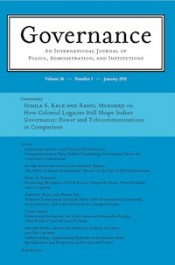Call for papers: SOG conference in Jerusalem January 5-7, 2014
The next conference of the IPSA Structure and Organization of Government Research Committee (SOG) will be hosted by the Department of Political Science and the Federman School of Public Policy at the Hebrew University of Jerusalem on January 5-7, 2014. SOG is the sponsoring organization of Governance. A Call for Papers is now available. The theme for the conference is “ What Makes Governmental Agencies Tick?.” The deadline for paper proposals is August 31, 2013. For more information, contact Moshe Maor (msmaor@mscc.huji.ac.il) or Sharon Gilad (gilads@mscc.huji.ac.il) at the Hebrew University of Jerusalem.
Blame the center
 In the current issue of Governance, Peter Mortensen of Aarhus University explains when regional officials are likely to use rhetoric that blames central government for unpopular decisions. Examining the behavior of officials within the Danish healthcare system, Mortensen explores the political and institutional factors that make some policymakers more likely to engage in blame-shifting strategies. Read the article.
In the current issue of Governance, Peter Mortensen of Aarhus University explains when regional officials are likely to use rhetoric that blames central government for unpopular decisions. Examining the behavior of officials within the Danish healthcare system, Mortensen explores the political and institutional factors that make some policymakers more likely to engage in blame-shifting strategies. Read the article.
How the supply of information shapes patterns of policymaking
In the current issue of Governance, Christina Boswell of the University of Edinburgh examines how differences in the supply of information about policy problems affects political attention to those problems. Contrasting UK policymakers’ attention to two subjects — asylum and illegal immigration — Boswell finds that a sporadic supply of information encourages punctuated rather than incremental policy responses. Read the article.
Book reviews: The new India; healthcare; republicanism in Australia
In the current issue of Governance, Krishna Tummala of Kansas State University reviews The New India by Kanishka Chowdhury, a “polemical work” that examines how “culture and politics come together” in contemporary India. Read the review. Jane Gingrich of the University of Minnesota reviews
Comparative Studies and the Politics of Modern Medical Care, edited by Theodore Marmor, Richard Freeman and Kieke Okma. “A crucial theoretical contribution to debates over comparative policy analysis,” says Gingrich. Read the review. And Jon Pierre of the University of Gothenburg provides an assessment of Fiducial Governance: An Australian Republic for the New Millennium by John Power: a brief but insightful “exercise in constitutional reform design.” Read the review.
Jacobs wins 2012 Levine Prize
The 2012 Levine Book Prize has been awarded to Governing for the Long Term: Democracy and the Politics of Investment (Cambridge University Press, 2011), by Alan M. Jacobs. Jacobs is an associate professor of political science at the University of British Columbia. The 2012 Levine Prize committee was composed of Professors Kutsal Yesilkagit (Utrecht School of Governance, committee chair), Eliza Lee (University of Hong Kong), and Victor Lapuente (University of Gothenburg). The committee says that Jacobs’ book “should force us to rethink the usual political economy assumptions of politicians as short-sighted re-election seekers. . . . The book provides a trenchant reminder of the power of ideas about the future to shape decisions taken today.” Read more about the Prize and the committee’s decision.
Eurocrats and organizational change: Worrying about careers
Co-editor Cox named director of Walker Institute
Governance’s co-editor, Robert H. Cox, has been appointed director of the Walker Institute of International and Area Studies at the University of South Carolina. Cox was previously co-director of the University of Oklahoma’s European Union Center. In addition to editing Governance, Cox also serves on the executive board of the International Political Science Association. Read the announcement from the University of South Carolina.
